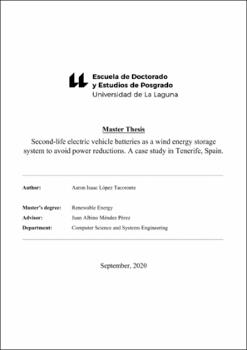Second-life electric vehicle batteries as a wind energy storage system to avoid power reductions. A case study in Tenerife, Spain.
Fecha
2021Resumen
Increasing energy demand leads to environmental challenges such as global warming and climate change.
This situation requires a paradigm shift to take place in the ways of generating energy. Sustainable carbon-free
energy sources, such as wind or solar, must increase rapidly to replace the generation systems based on
conventional sources that predominate today. However, the increase in the use of renewable energy systems has
produced an instability of the grid, due to the stochastic nature of this type of energy, especially wind energy.
These challenges require storage systems that provide viable power system operation solutions.
In this work, the use of second-life electric vehicle batteries has been proposed to design electrical energy
storage systems at a lower cost, so that surplus wind energy can be stored at times of low electricity demand
and high wind resources, and thus, being able to avoid power reductions, with the main objective of reducing
energy waste and making intelligent use of stored energy, in order to obtain an additional economic benefit.
Firstly, the role of wind energy in the electricity generation structure of the island of Tenerife, Spain, has been
studied. Second, research has been carried out on electric mobility on the island under study, so that the capacity
of second-life electric vehicle batteries that may be available in the future can be estimated. And, finally, a
technical and economic feasibility study has been carried out for the introduction of these storage systems in a
wind farm in Tenerife. In the future, the proposed technology has the potential to become a low-cost battery
energy storage system that is essential for increasing the integration of renewable energy into the grid, as well
as reducing the environmental footprint by prolonging the useful life of the batteries for electric vehicles, which
will offer added value to the entire system.





